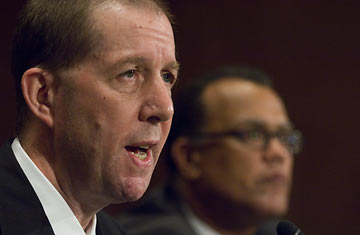
Ron Bloom, senior adviser on the auto industry for the U.S. Treasury Department, appears during the Senate Banking hearing on the federal government's role in restructuring the auto industry.
GM and Chrysler may be out of bankruptcy protection, but they are not yet out of the government's hands. The automotive task force created by the White House remains hard at work, monitoring the car industry's cash flows and production capacity, and also preparing for an initial public offering that eventually will allow the US Treasury to liquidate its stake in General Motors, and ultimately get out of Chrysler. "We are going to be very careful stewards of the taxpayer's money," says Ron Bloom, the head of the task force who is also rumored to be up for a new spot in the Obama Administration overseeing U.S. manufacturing policy.
Translation: With an estimated $100 billion in government aid already extended to the automakers, it's now time for a cold, critical eye. "We can't have as an objective, unfortunately, preserving the entire capacity of the supply base," says Bloom, noting that GM, Chrysler as well as the Ford Motor Co. have already undergone dramatic downsizing. "They did that because Americans aren't buying the same number of vehicles they did two years ago and we don't think they will for some number of years ahead," he says. Indeed, with Cash For Clunkers due to expire Monday, demand for cars could soon face a sudden, precipitous drop.
All of which means that the auto industry may keep shrinking, and Bloom wants no hand in picking survivors. "I don't think the government should decide who should make axles and who should make steering wheels. That's not a proper role," he says. The hands-off response has been criticized by some suppliers who felt they should have received government assistance after GM and Chrysler cut production. Yet in a way, they did — the Cash-for-Clunkers program has prompted many automakers to increase production through the fall, which will help suppliers.
How much longer will the U.S. be a partner to Detroit? The government now owns 60% of the shares in the "new" GM, but seeks to sell its stake as soon as "practical," says Bloom. A quick U.S. exit from GM could be tricky — announcing a near-term intention to sell government shares could undermine any public offering of stock in the new GM. (Prospective investors might hold back for fear of an avalanche of government selling.) Bloom promises that simply won't happen. "We're not going to be foolish. We're not going to dump the stock tomorrow. It has to be done in thoughtful way," he says.
Of course, if Bloom gets a new appointment, the tricky exit strategy could be someone else's problem.
